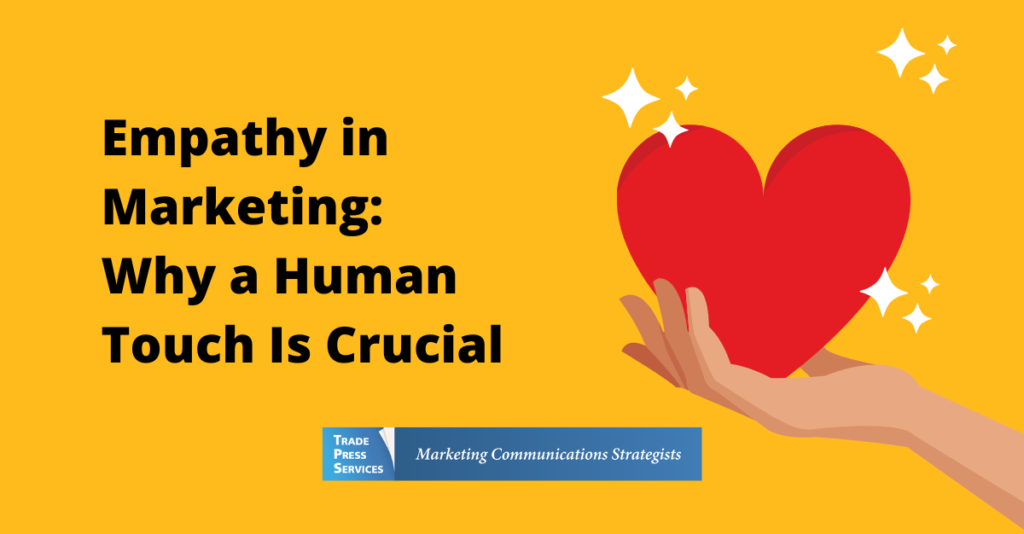
With the rise of remote workplaces, artificial intelligence tools, and data utilization, it’s easy to assume that relationships are founded on a network of technologies. These digital transformations sometimes cause customers to lose sight of the people behind a brand. The personal, human touch plays a vital role in successful business relationships. Empathy makes that genuine connection possible in an increasingly digital and global marketplace. Roger Ebert stated that “empathy is the most essential quality of civilization.” Does this make it the most essential quality of a successful, customer-centric marketing approach?
What Is Empathy and Why Is It Important in Marketing?
Empathy is a vital aspect of emotional intelligence that refers to a person’s ability to understand and share the feelings of others. Saleema Vellani, professor of Design Thinking and Entrepreneurship at Johns Hopkins University, says it is especially important today, in a globally connected world still impacted by the pandemic alongside racial and geopolitical turmoil. “We have designed systems, cultures, spaces, and norms that don’t embrace empathy,” she says. “And as a result, we are suffering. Empathy is essential for personal and professional growth, and is a superpower when used for good.”
At its core, empathy is about being genuine. It goes beyond the rational and focuses on feelings, a concept that is often counterintuitive in business. In marketing, it isn’t simply about soliciting an emotional response. Instead, it reflects a fundamental understanding of the individuals on both sides of a business interaction, consideration for their needs, feelings and circumstances, and the resulting messaging that connects on a human level. Here’s what empathy can accomplish when practiced from a marketing standpoint:
-
- Empathy fuels customer connections. It’s a top priority of any marketer to know their target market through and through. Empathy enables this. Serial entrepreneur Deep Patel says, “Nothing is as mind-broadening as allowing yourself to really see the world from another person’s perspective. When you focus on the value you give to others, you start seeing other people’s needs more clearly.” Seek to understand the perspectives of others by imagining yourself in their shoes. This practice of envisioning the varying perspectives of your customers propels empathy and leads to better and more meaningful relationships.
- Empathy fosters transparency. Much like Vellani’s claim that today’s systems and cultures don’t reward empathy, many agree that in the past 10 years, we’ve entered an “era of distrust” across news, media and business. This distrust isn’t a danger, but rather a healthy questioning of traditional norms, business practices, and abundant digital media. It also means customers value honesty and transparency from a brand more than ever before. In fact, 73 percent of consumers are willing to pay more for products that guarantee total transparency while 86 percent of Americans believe transparency from businesses is more important than ever before. Empathy increases a brand’s ability to respond and communicate truthfully, addressing the points and values that are most important to customers, employees and other target audiences.
- Empathy creates brand advocates. When brands treat customers with exceptional care and kindness, they take notice. When someone is treated well, they want to share it with others, especially in a largely disconnected and impersonal business world. Using empathy in marketing creates an exceptional customer experience. That experience turns customers into repeat buyers and brand advocates who will encourage others to take advantage of your products and services.
Businesses Benefit, Too
Empathy-based marketing can generate remarkable and lasting business success. When the concept takes place inside an organization, results can be even more dramatic. When leaders are mindful and emotionally attuned to employees, they create an empathetic workplace that improves communication and enhances the quality and impact of their interactions with each other and their customers. An empathetic approach also improves employee retention. While customers are a central focus for marketers, without dedicated and skilled employees, a business cannot survive. Empathy plays a central role in ensuring employees are listened to, supported and happy.
Commit to Empathy as a Workplace Culture

Discussing the importance of empathy is easy. Putting it into practice isn’t as effortless. An empathetic workplace and brand aren’t simply instructive or blindly optimistic. Instead, empathy demands a constant effort that moves it from a theory to a fundamentally shared organizational value and practice. As Theodore Roosevelt said, “People don’t care how much you know until they know how much you care.” When we choose to focus on others and proactively strive to understand their perspective, we create a ripple effect that naturally excels in empathetic habits throughout the organization. This is what leads to more satisfied customers, employees and stakeholders, positively contributing to an organization’s growth and bottom line.

